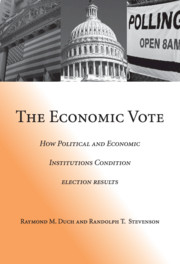Book contents
- Frontmatter
- Contents
- Preface
- 1 Introduction
- Part I Describing the Economic Vote in Western Democracies
- Part II A Contextual Theory of Rational Retrospective Economic Voting: Competency Signals
- Part III A Contextual Theory of Rational Retrospective Economic Voting: Strategic Voting
- Part IV Conclusion and Summary
- Appendix A
- Appendix B
- Appendix C
- References
- Index
- Cambridge Cultural Social Studies
1 - Introduction
Published online by Cambridge University Press: 06 July 2010
- Frontmatter
- Contents
- Preface
- 1 Introduction
- Part I Describing the Economic Vote in Western Democracies
- Part II A Contextual Theory of Rational Retrospective Economic Voting: Competency Signals
- Part III A Contextual Theory of Rational Retrospective Economic Voting: Strategic Voting
- Part IV Conclusion and Summary
- Appendix A
- Appendix B
- Appendix C
- References
- Index
- Cambridge Cultural Social Studies
Summary
It is virtually a universal belief among politicians, political commentators, and even voters that elections are referenda on the economy. Politicians fill their speeches with economic rhetoric; political commentators generate endless streams of economic analysis, and high-paid consultants base their statistical predictions on little else. The extent and depth of this belief is revealed most starkly when it appears to have been violated. When incumbents win despite a bad economy or lose despite a good one, we observe in the postelection hand-wringing a concerted search for ad hoc explanations that preserve the more fundamental belief that the economy matters. Perhaps voters' perceptions of the “real” economy were distorted; foreign policy issues may have overshadowed its effects; or, maybe, ineffective campaign strategies undermined the expected economic vote. Ultimately, however, in most elections, the economy is thought to be determinate.
Popular beliefs, of course, are not social science laws and exceptions to economic determinism are easy to find, even if they are often explained away as idiosyncratic. More generally, the systematic empirical work on economic voting, conducted in most of the advanced democracies over the last thirty years, reveals not a universal law of economic voting but, rather, a conditional one. Economic voting is very likely widespread and often important; but, its magnitude and nature across elections is almost certainly variable (Duch, 2001; Lewis-Beck and Stegmaier, 2000, 2006). There are limits, however, to the guidance the extant empirical literature can give us.
- Type
- Chapter
- Information
- The Economic VoteHow Political and Economic Institutions Condition Election Results, pp. 1 - 36Publisher: Cambridge University PressPrint publication year: 2008

